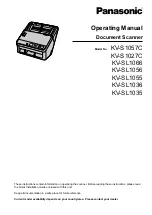
laserBIRD™ Installation and Operation Guide
46
46
46
46
ANGLES
ASCII HEX DECIMAL BINARY
Command Byte W 57 87 01010111
In the ANGLES mode, The Bird outputs the orientation angles of the sensor with respect to the
transmitter. The orientation angles are defined as rotations about the Z, Y, and X axes of the
sensor. These angles are called Zang, Yang, and Xang or, in Euler angle nomenclature, Azimuth,
Elevation, and Roll. The output record is in the following format for the six transmitted bytes:
MSB LSB
7 6 5 4 3 2 1 0 BYTE #
1 Z8 Z7 Z6 Z5 Z4 Z3 Z2 #1 LSbyte Zang
0 Z15 Z14 Z13 Z12 Z11 Z10 Z9 #2 MSbyte Zang
0 Y8 Y7 Y6 Y5 Y4 Y3 Y2 #3 LSbyte Yang
0 Y15 Y14 Y13 Y12 Y11 Y10 Y9 #4 MSbyte Yang
0 X8 X7 X6 X5 X4 X3 X2 #5 LSbyte Xang
0 X15 X14 X13 X12 X11 X10 X9 #6 MSbyte Xang
Zang (Azimuth) takes on values between the binary equivalent of +/- 180 degrees. Yang
(Elevation) takes on values b/- 90 degrees, and Xang (Roll) takes on values b/-
180 degrees. As Yang (Elevation) appr/- 90 degrees, the Zang (Azimuth) and Xang (Roll)
become very noisy and exhibit large errors. At 90 degrees the Zang (Azimuth) and Xang (Roll)
become undefined. This behavior is not a limitation of The Bird - it is an inherent characteristic of
these Euler angles. If you need a stable representation of the sensor orientation at high Elevation
angles, use the MATRIX output mode.
The scaling of all angles is full scale = 180 degrees. That is, +179.99 deg = 7FFF Hex, 0 deg = 0
Hex, -180.00 deg = 8000 Hex.
To
convert the numbers into angles (degrees)
first cast it into a signed integer. This will give
you a number from +/- 32767. Second multiply by 180 and finally divide the number by 32768 to
get the angle. The equation should look something like this:
(signed int(Hex #) * 180) / 32768
Summary of Contents for laserBIRD
Page 3: ......
Page 5: ......
Page 7: ......
Page 11: ......
Page 21: ......
Page 32: ...3 Configuration and Basic Operation 25 25 25 25 Figure 3 3 Sensor Mounting Dimensions inches...
Page 42: ...3 Configuration and Basic Operation 35 35 35 35 Figure 3 6 Horizontal Field of View...
Page 43: ...laserBIRD Installation and Operation Guide 36 36 36 36 Figure 3 7 Vertical Field of View...
Page 45: ......
















































